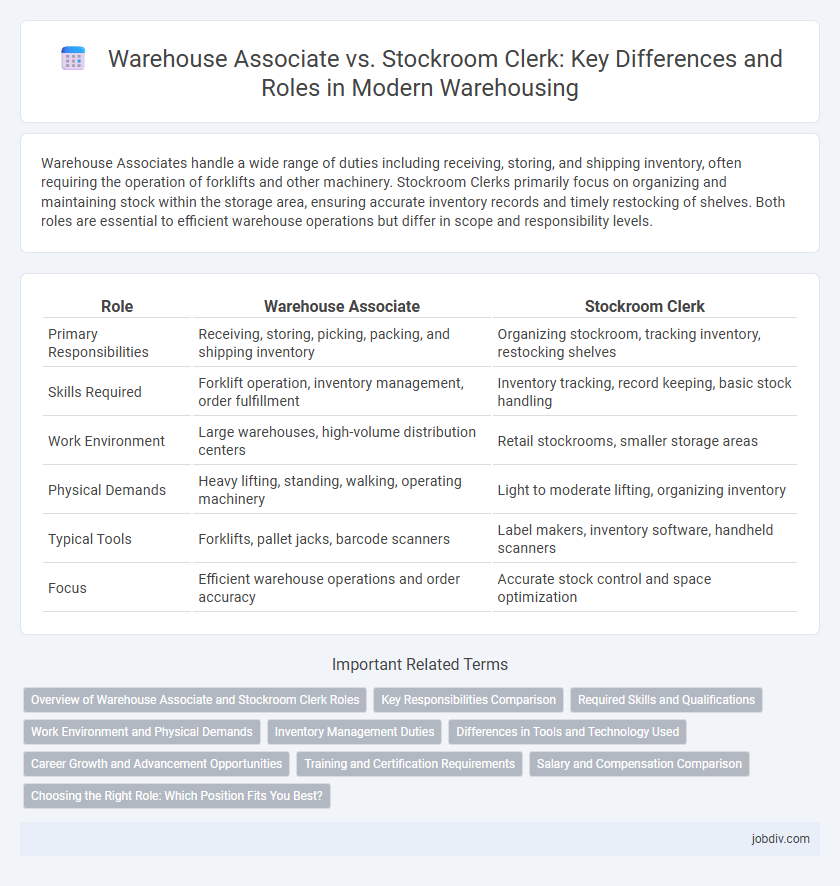Warehouse Associates handle a wide range of duties including receiving, storing, and shipping inventory, often requiring the operation of forklifts and other machinery. Stockroom Clerks primarily focus on organizing and maintaining stock within the storage area, ensuring accurate inventory records and timely restocking of shelves. Both roles are essential to efficient warehouse operations but differ in scope and responsibility levels.
Table of Comparison
| Role | Warehouse Associate | Stockroom Clerk |
|---|---|---|
| Primary Responsibilities | Receiving, storing, picking, packing, and shipping inventory | Organizing stockroom, tracking inventory, restocking shelves |
| Skills Required | Forklift operation, inventory management, order fulfillment | Inventory tracking, record keeping, basic stock handling |
| Work Environment | Large warehouses, high-volume distribution centers | Retail stockrooms, smaller storage areas |
| Physical Demands | Heavy lifting, standing, walking, operating machinery | Light to moderate lifting, organizing inventory |
| Typical Tools | Forklifts, pallet jacks, barcode scanners | Label makers, inventory software, handheld scanners |
| Focus | Efficient warehouse operations and order accuracy | Accurate stock control and space optimization |
Overview of Warehouse Associate and Stockroom Clerk Roles
Warehouse Associates manage inventory movement, order fulfillment, and shipment processing to ensure efficient warehouse operations. Stockroom Clerks focus on organizing stock, maintaining accurate inventory records, and supporting stock replenishment activities. Both roles are essential for streamlined supply chain management and inventory control.
Key Responsibilities Comparison
Warehouse Associates primarily handle the receipt, storage, and distribution of goods, ensuring accurate inventory control and efficient order fulfillment. Stockroom Clerks focus on organizing stockroom inventory, maintaining item records, and facilitating internal requisitions to support seamless operations. Both roles demand strong attention to detail and coordination to optimize warehouse workflow and inventory accuracy.
Required Skills and Qualifications
Warehouse Associates require proficiency in inventory management software, strong organizational skills, and physical stamina to handle loading and unloading tasks efficiently. Stockroom Clerks emphasize attention to detail, accuracy in record-keeping, and familiarity with barcode scanning systems to ensure precise stock tracking. Both roles typically demand high school diplomas, basic math skills, and the ability to work in fast-paced environments.
Work Environment and Physical Demands
Warehouse Associates typically work in large distribution centers with fast-paced environments requiring heavy lifting, prolonged standing, and frequent use of forklifts or pallet jacks. Stockroom Clerks usually operate in smaller retail or storage facilities, performing less physically strenuous tasks such as inventory tracking, shelving, and light lifting. Both roles demand physical stamina, but Warehouse Associates face more intense labor due to higher volume and operational scale.
Inventory Management Duties
Warehouse Associates and Stockroom Clerks both handle inventory management but differ in scope and responsibilities. Warehouse Associates typically oversee receiving, inspecting, and organizing products within the warehouse, ensuring accurate stock levels and timely order fulfillment. Stockroom Clerks focus more on maintaining inventory records, restocking shelves, and tracking product movement to support overall warehouse efficiency.
Differences in Tools and Technology Used
Warehouse Associates often operate advanced inventory management systems, barcode scanners, and forklifts to efficiently handle large volumes of goods. Stockroom Clerks typically use basic handheld scanners and manual record-keeping tools for inventory tracking and restocking. The technological proficiency required for Warehouse Associates is generally higher due to the integration of automated warehouse management software and material handling equipment.
Career Growth and Advancement Opportunities
Warehouse Associates often have broader responsibilities including inventory management, order fulfillment, and operating machinery, which provide diverse skill development and greater career advancement opportunities compared to Stockroom Clerks who typically focus on receiving and storing merchandise. Experience as a Warehouse Associate can lead to supervisory roles or specialized positions such as logistics coordinator, whereas Stockroom Clerks may face more limited upward mobility within the stockroom domain. Companies value versatile skill sets acquired by Warehouse Associates, making them prime candidates for promotion and cross-functional career growth in warehousing and supply chain sectors.
Training and Certification Requirements
Warehouse Associates typically undergo comprehensive training programs covering inventory management, safety protocols, and equipment operation, often requiring certifications such as OSHA or forklift operator licenses. Stockroom Clerks usually receive training focused on inventory tracking, order processing, and basic warehouse software systems, with fewer formal certification requirements. Emphasizing specialized certifications for Warehouse Associates enhances operational efficiency and safety in high-volume logistics environments.
Salary and Compensation Comparison
Warehouse Associates typically earn an average hourly wage ranging from $14 to $18, reflecting their hands-on roles in inventory management, shipping, and receiving. Stockroom Clerks generally receive slightly lower compensation, with hourly rates between $12 and $16, due to their focus on organizing and maintaining stockroom records. Benefits and overtime opportunities may vary by employer but often provide Warehouse Associates with a competitive overall compensation package compared to Stockroom Clerks.
Choosing the Right Role: Which Position Fits You Best?
Warehouse Associates handle a wide range of tasks including receiving, storing, and shipping goods, requiring physical stamina and basic inventory management skills. Stockroom Clerks focus primarily on organizing stock, maintaining accurate records, and supporting inventory control processes, demanding attention to detail and proficiency with tracking systems. Selecting the right role depends on your strengths in physical activity versus administrative accuracy, and whether you prefer hands-on logistics or meticulous stock documentation.
Warehouse Associate vs Stockroom Clerk Infographic

 jobdiv.com
jobdiv.com